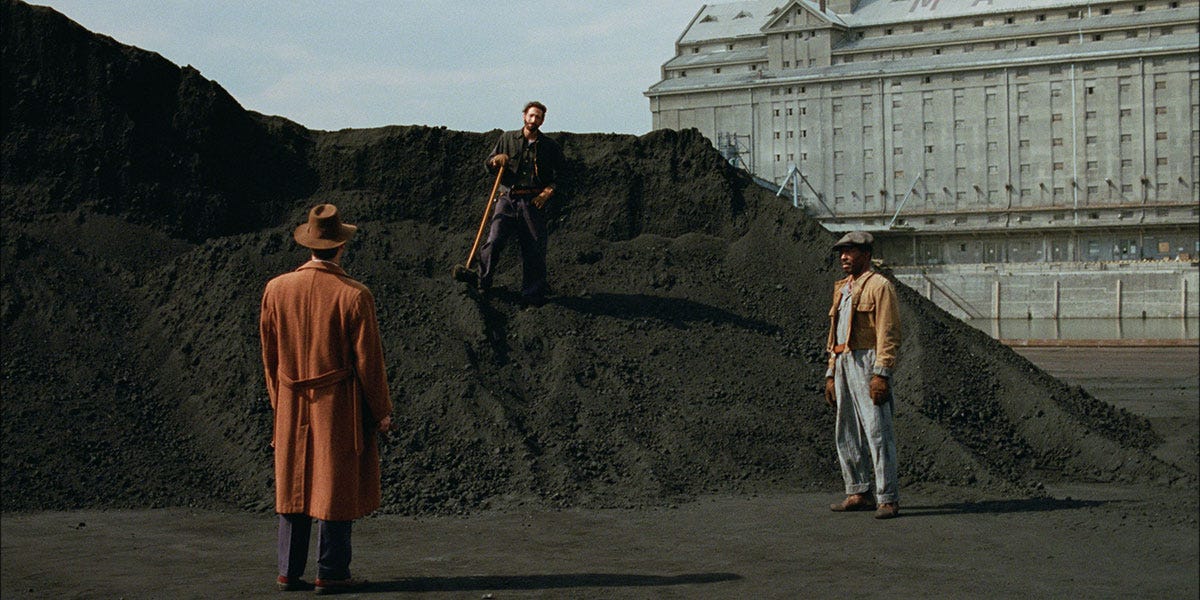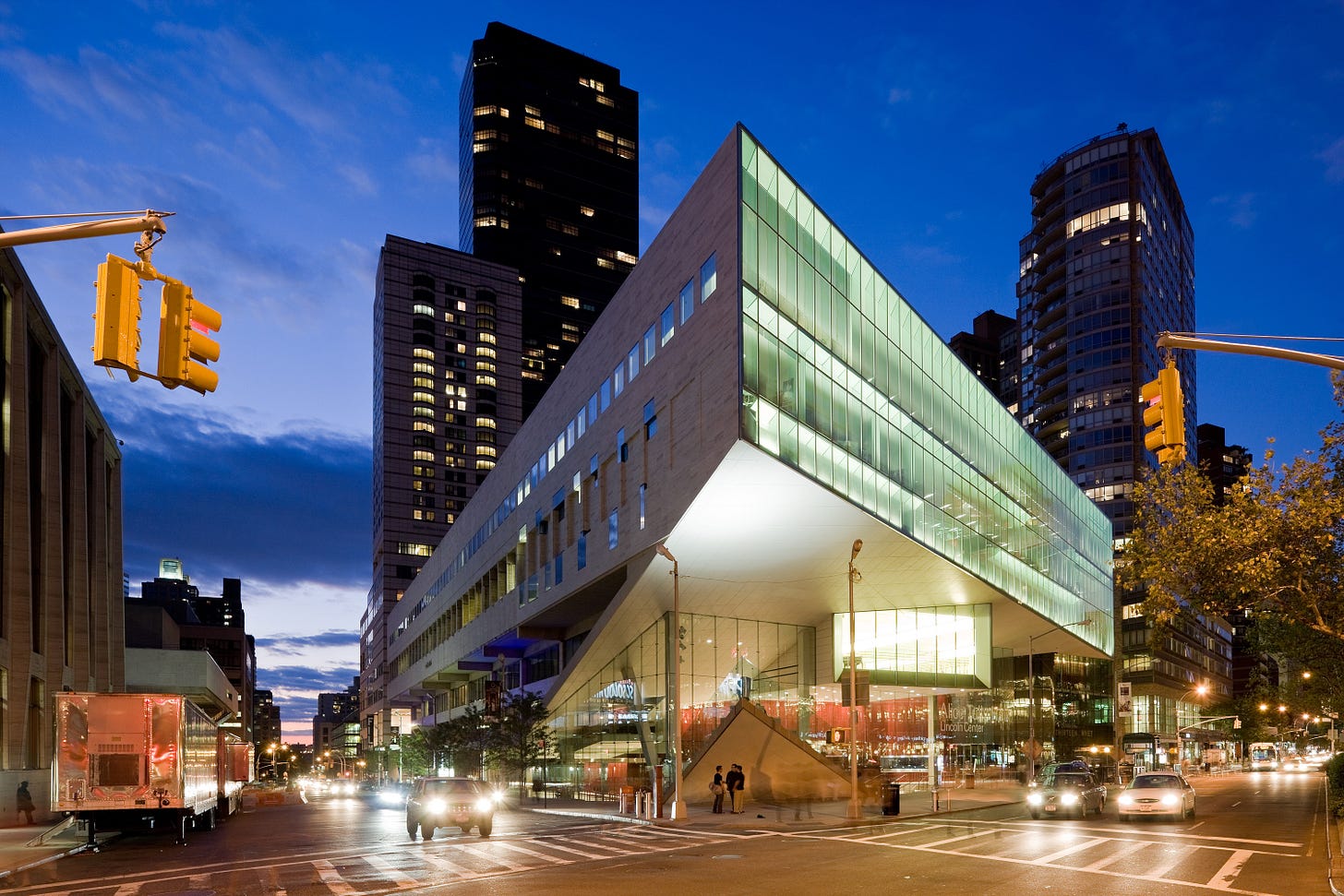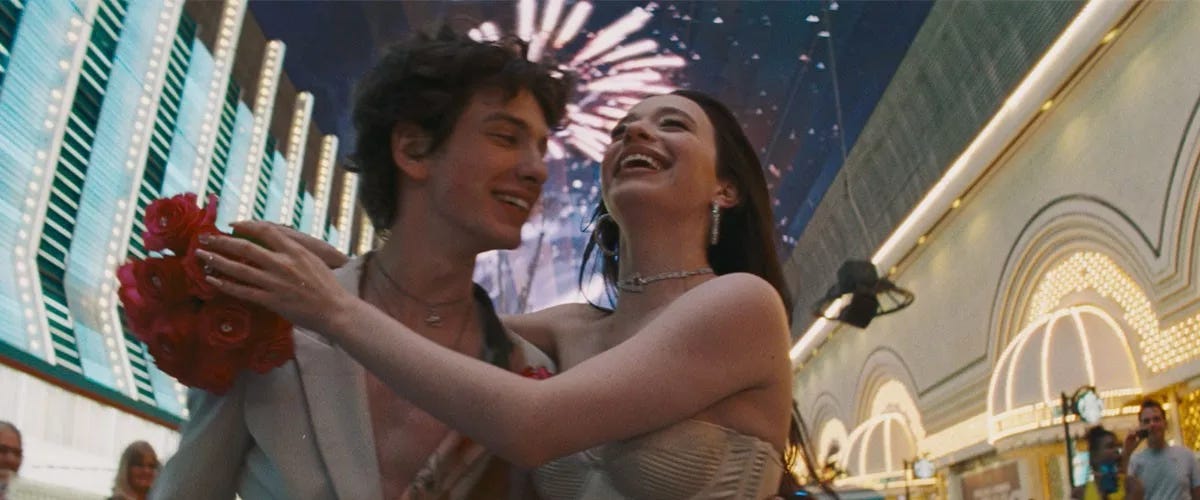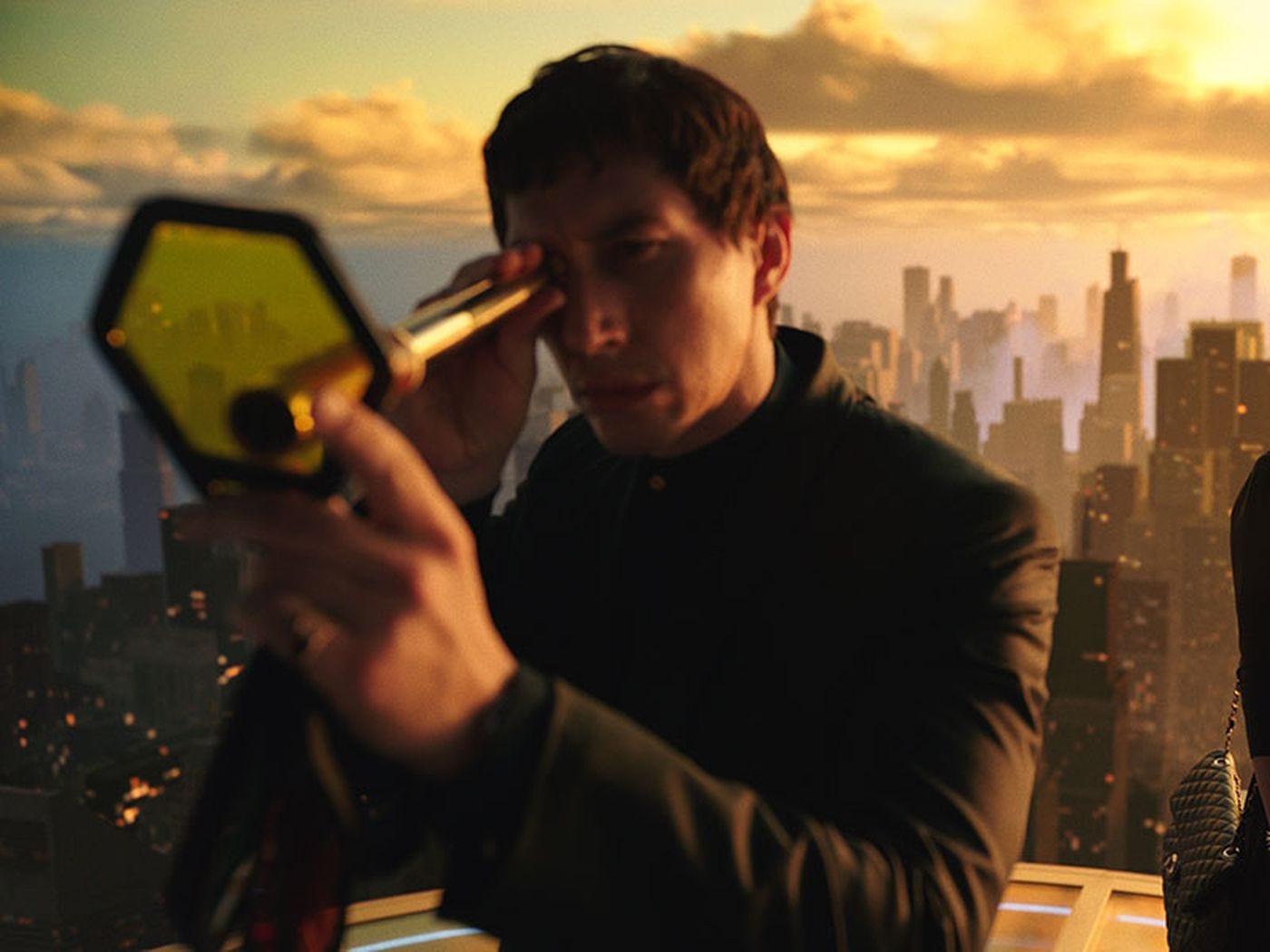Three years ago, I attended my first ever film festival screening—The French Dispatch at the 59th New York Film Festival—and basically ascended. This was before I had taken full advantage of New York’s bustling film scene (where a random movie ticket you book with friends could be followed by a Q&A with Austin Butler and Jodie Comer, for nothing more than the price of your AMC A-List subscription), and so the mere experience of seeing a new movie from one of my favorite directors, before my friends, surrounded by ostensible cinephiles on the Upper West Side, was enough to thrill me.
Every year since then, my investment in the festival (figurative and financial) has increased in proportion to the festival’s overall accessibility, which—despite Eras Tour-esque queues when tickets first go on sale—continues to improve. That’s great! Film festivals and advance screenings shouldn’t be (exclusively) for the be-tuxed and be-gowned in Venice; randos like me should be able to go too, and then write about it on Substack. Well, now we can.
Despite some of that initial rush of exclusivity wearing off, NYFF continues to be a source of joy each fall. After the stress of securing tickets, I’m able to mark my calendar with a personal, spiritual beginning of Awards Season, for lack of a better framing for the time of year when most of the good movies come out. It’s not uncommon for me to have multiple movies on my schedule over a week or two; it’s rare that they hold as much excitement as my annual festival screenings.
The cool and strange thing about the NYFF is that it’s long and somewhat public. Having not been to Cannes or Venice or even the other stateside festivals, I have an image in my mind of glitzy red carpets and high-security theaters. Maybe they’re not actually like that, but the NYFF definitely isn’t: over two-ish weeks in early October, the fest holds hundreds of screenings across a handful of theaters in the Lincoln Center area of the lower-Upper West Side, none of which boasts much more of a buffer than a metal-detector and a friendly ticket-taker. Even without a ticket, you have a decent shot of glimpsing the featured directors and actors as they walk down the glass-walled step-and-repeats of the festival’s centerpiece theater, Alice Tully Hall, or else seeing one of the many filmmakers and stars who come only as spectators, trying and sometimes succeeding to blend in with the crowd.
Apart from being a generally pleasant-if-genteel part of town, Lincoln Center has the added boon of housing both the Metropolitan Opera and The Juilliard School, meaning that even if your actual screening is a bust, its very staging retains an air of artfulness. Perpetuating this idea is the space itself, which—like New York—is a mishmash of elbows and shoulders, artists jostling for room. To get to a screening at Walter Reade Theater, you can take a footbridge directly from the Opera, walking over taxis and the M66. Look up from your queue outside Alice Tully and you might see ballet students stretching, or french horn players packing their instruments. Walk out into the October sun after a movie at the Francesca Beale Theater and you can climb right up onto the roof of the building, which has been ever-so-charmingly reimagined into a sloping knoll for students or tourists or festival-goers to lounge upon between classes or Broadway shows or movies.
In short, being at the New York Film Festival doesn’t feel as much like being at a Film Festival as it does like being in New York. Beyond its immersion in the city’s ongoing life, the festival’s length means you could attend a screening or two, wait two entire weeks, go on a trip, work your job, live your life—and then attend a screening or two more, all at the same “festival.”
That was my precise experience this year, marking a difference from past festivals when my schedules were more compact. And it was a strange experience—one that has me thinking, apparently, about the nature of an event like this in general, and what it is about seeing highly anticipated movies at a buzzy non-festival festival so I can log them on Letterboxd a few weeks early that still gives me such a thrill. My specific thoughts on the actual movies I watched at the NYFF this year (all “name brand” films, so to speak) are logged on that app, but in the spirit of consolidating these two weeks and four films into one broader Loggable Activity, consider the below a review of the experience of watching each of them.
Screening #1: Nickel Boys - dir. RaMell Ross
The first day of my 2024 NYFF began at 4AM local time in Auburn, Alabama. Having luckily dodged the wrath of Hurricane Helene while traveling for a work shoot, I wrapped my War Eagle business by 8AM and drove the two hours to the Atlanta airport. A quick flight home, a short failed nap, a cross-town ride on the M66, and a sighting of Barry Jenkins in the lobby later, I was sitting in my neck-craning second-row seat just in time for writer/director/visionary RaMell Ross to take the stage and introduce his adaptation of Colson Whitehead’s novel.
It’s a testament to Ross’ transcendent work that despite my borderline fugue state and the periphery-annihilating perspective from my seat, I found myself utterly transported. The two-and-a-half hours of his film flew by even with my constant internal debate over whether to rest my head on my chair and risk dozing or to simply accept a sub-par view. No matter; you could watch Ross’ movie through a telescope from Mars and still come away grateful for your vantage point, so powerful and naturally innovative are his images. I wasn’t overly taken with Whitehead’s undeniably important novel, but thankfully Ross was, and so generously lets us borrow his vision for a couple of hours. Overwhelmed by a day that started in Alabama and ended in Jim Crow-era Florida via the Upper West Side, I bussed home and crashed into slumber.
Screening #2: Anora - dir. Sean Baker
My second screening this year most fully embodied the folded-into-everyday-NY-life nature of the festival. Before heading to Alice Tully for Sean Baker’s neon-screwball update of Pretty Woman, I headed to my friend Logan’s apartment, where he made us eggs and we tore at bagels ahead of a rainy walk to our screening. I saw Baker’s last film, Red Rocket, with Logan as well, so this was a nice full-circle moment and a fun opportunity to tag along with a friend to his first festival screening.
We both thoroughly enjoyed the film and the somewhat awkwardly moderated Q&A with Baker and Mikey Madison that followed. On our still-rainy walk back to his apartment, Logan insightfully noted that our audience seemed to abandon any concert hall pretensions in favor of a more New Yorkily honest appreciation of the work, laughing fully and presently rather than in the performative, overly knowing way that you sometimes hear in uptown theaters. Our discussion of the movie was nearly as enjoyable as the film itself, following the many distributaries and ellipses Baker so thoughtfully structures his films around. We arrived back at Logan’s apartment to some fresh pastries from his family, which was much-needed nourishment before I headed to…
INTERMISSION: Megalopolis - dir. Francis Ford Coppola
Through either a lack of foresight or a(n un)fortunate twist of fate, I’d already booked a non-NYFF solo ticket to Francis Ford Coppola’s late-stage disasterclass for a mere hour or so after our Anora screening. Still tired from my cross-country Nickel Boys day but not wanting to forfeit a seat in AMC Lincoln Square’s megalopolitan IMAX theater, I bravely persisted. And I’m glad I did—if not because it’s a great movie (it’s not), then because it’s an amusing one. Besides, I’d already seen one great movie that day, and multiple great movies from Coppola in my lifetime. If he’s no longer capable of making The Godfather II, I’d much rather him be making gonzo stuff like this than trying and failing to recapture old glory. And despite my brain-melting few days of cinema, I’m glad I saw this in the midst of (and across the street from) my “festival”—for all of its failures, its big-screen goofiness felt at home next to a celebration of filmic ambition in its many forms.
Screening #3: Blitz - dir. Steve McQueen
Then two weeks passed. I worked, I took the train to Long Island, I saw Vampire Weekend play at the Garden; life was lived. Coincidentally, my job also moved from its office right across the street from Alice Tully Hall to a new downtown location. By the time my third NYFF screening crept up, I was further from Lincoln Center than I’d been in years, spiritually and otherwise, and had functionally ceased feeling like I was in the middle of any kind of festival. And yet, I was—so after a tiring week of work, I made my way back to the UWS and climbed the stairs to the hall’s balcony, where my friend Harry and I took in the great Steve McQueen’s good new movie about the titular blitz of London during World War II.
McQueen has never been bad, and the uncharacteristically straightforward Blitz isn’t either, even if its deceptively traditional style also had my bleary eyes and tired mind to contend with. McQueen, presumably fresh off the plane from the London Film Festival, also seemed tired as he briefly intro’d his film. With no disrespect in either direction, I think we were both ready to get home and sleep.
Screening #4: The Brutalist - dir. Brady Corbet

A day later, I was rested and ready to tackle my last film of the fest (and one of the buzziest titles there): Brady Corbet’s three-and-a-half-hour epic, The Brutalist. Sight largely unseen, Corbet’s film has already been hailed as both a totemic American masterpiece and an empty poster child of film bro-ery. And to be fair, a majority of the men in the bathroom line during the film’s fifteen-minute intermission did have the same shoes and clothes and tote bags that I do, though perhaps that’s just some self-selection at the same fest that saw hours-long lines for a mobile Criterion Closet. Either way, after taking in the gorgeous early-fall weather in the tree-lined plaza across from Alice Tully while Harry scarfed down his pre-show Morton Williams deli sandwich, we joined our brethren and buckled in.
I don’t have anything definite to say about the movie yet, even in my more considered Letterboxd review—but I know I loved it. For all the puffery (more from Corbet’s fans than from the director himself), the movie felt as grand and towering as billed, boasting more-than-sturdy construction without losing the oblique nature of any epic worth its weight in 70mm film stock. And call me a sucker for the established ambiance of my environment, but sitting with a like-minded friend in a gorgeous concert hall on the illustrious Upper West Side while a festival employee shouted out the projectionists raining cinematic light down from high above our heads… that did something for me!
Maybe that feeling was just the surprisingly emotional culmination of four overpriced movie tickets bookending two otherwise pleasant, unremarkable weekends of fall. But that is the New York Film Festival to me—this year, hopefully next year, and, should I be so lucky, forever.









